Analysis of Offshoring and Outsourcing on Morrison's Operations
VerifiedAdded on 2020/10/05
|37
|8873
|168
Report
AI Summary
This research project analyzes the benefits and risks of offshoring and outsourcing on the business operations of Wm Morrison Supermarkets plc. The report begins with an introduction outlining the research aim, objectives, and questions, followed by a literature review that explores the concepts of offshoring and outsourcing, their benefits (such as cost reduction and favorable government policies), and their risks (including cultural differences and communication problems). The methodology section details the research approach, techniques, and data collection methods. The report then presents the findings, including an executive summary, methodology details, and a discussion of the research outcomes. It concludes with recommendations for managing risks and improving offshoring and outsourcing strategies, along with a reflection on the research methods and lessons learned. The project aims to provide a comprehensive understanding of how offshoring and outsourcing impact Morrison's business performance at a global level, offering insights into strategic decision-making and operational efficiency.
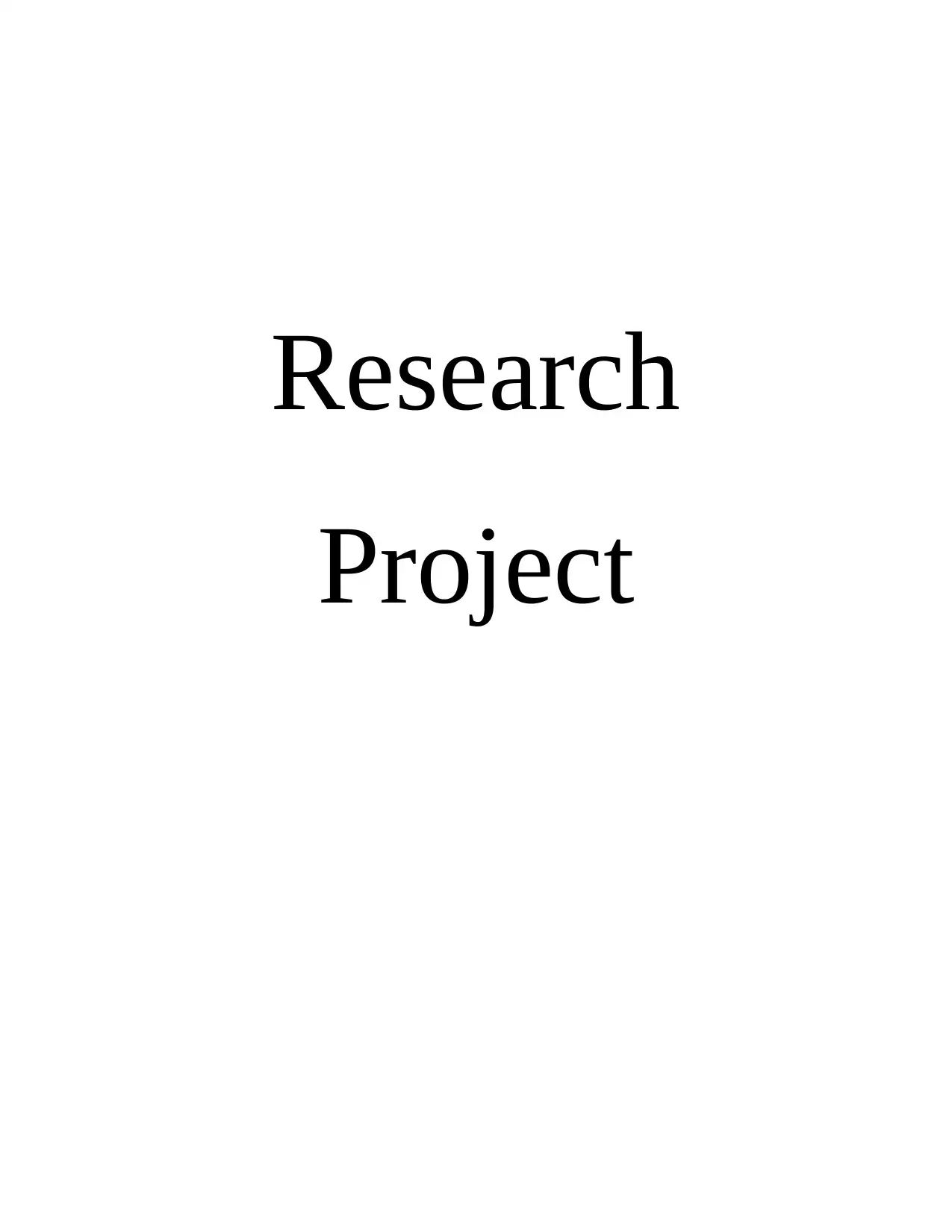
Research
Project
Project
Paraphrase This Document
Need a fresh take? Get an instant paraphrase of this document with our AI Paraphraser
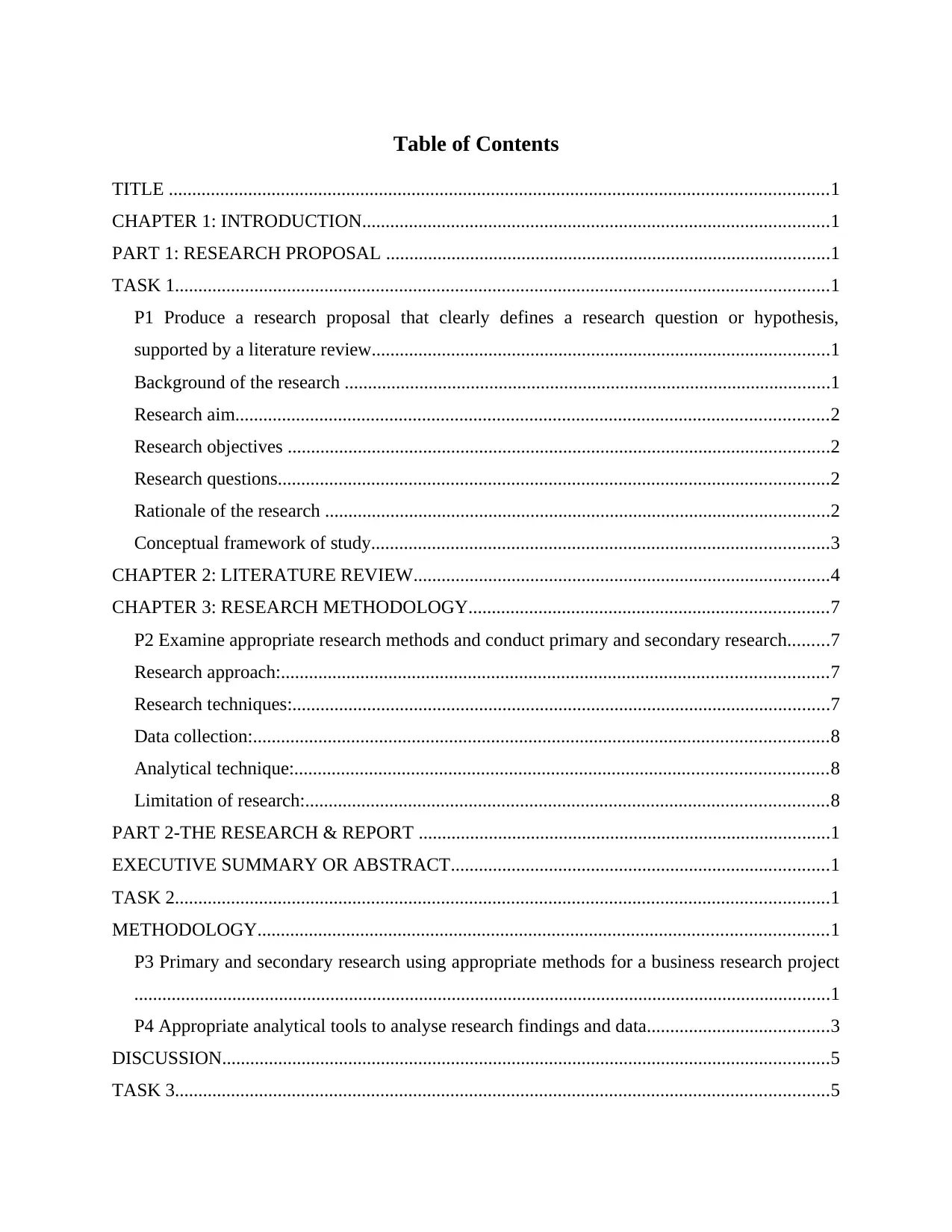
Table of Contents
TITLE .............................................................................................................................................1
CHAPTER 1: INTRODUCTION....................................................................................................1
PART 1: RESEARCH PROPOSAL ...............................................................................................1
TASK 1............................................................................................................................................1
P1 Produce a research proposal that clearly defines a research question or hypothesis,
supported by a literature review..................................................................................................1
Background of the research ........................................................................................................1
Research aim...............................................................................................................................2
Research objectives ....................................................................................................................2
Research questions......................................................................................................................2
Rationale of the research ............................................................................................................2
Conceptual framework of study..................................................................................................3
CHAPTER 2: LITERATURE REVIEW.........................................................................................4
CHAPTER 3: RESEARCH METHODOLOGY.............................................................................7
P2 Examine appropriate research methods and conduct primary and secondary research.........7
Research approach:.....................................................................................................................7
Research techniques:...................................................................................................................7
Data collection:...........................................................................................................................8
Analytical technique:..................................................................................................................8
Limitation of research:................................................................................................................8
PART 2-THE RESEARCH & REPORT ........................................................................................1
EXECUTIVE SUMMARY OR ABSTRACT.................................................................................1
TASK 2............................................................................................................................................1
METHODOLOGY..........................................................................................................................1
P3 Primary and secondary research using appropriate methods for a business research project
.....................................................................................................................................................1
P4 Appropriate analytical tools to analyse research findings and data.......................................3
DISCUSSION..................................................................................................................................5
TASK 3............................................................................................................................................5
TITLE .............................................................................................................................................1
CHAPTER 1: INTRODUCTION....................................................................................................1
PART 1: RESEARCH PROPOSAL ...............................................................................................1
TASK 1............................................................................................................................................1
P1 Produce a research proposal that clearly defines a research question or hypothesis,
supported by a literature review..................................................................................................1
Background of the research ........................................................................................................1
Research aim...............................................................................................................................2
Research objectives ....................................................................................................................2
Research questions......................................................................................................................2
Rationale of the research ............................................................................................................2
Conceptual framework of study..................................................................................................3
CHAPTER 2: LITERATURE REVIEW.........................................................................................4
CHAPTER 3: RESEARCH METHODOLOGY.............................................................................7
P2 Examine appropriate research methods and conduct primary and secondary research.........7
Research approach:.....................................................................................................................7
Research techniques:...................................................................................................................7
Data collection:...........................................................................................................................8
Analytical technique:..................................................................................................................8
Limitation of research:................................................................................................................8
PART 2-THE RESEARCH & REPORT ........................................................................................1
EXECUTIVE SUMMARY OR ABSTRACT.................................................................................1
TASK 2............................................................................................................................................1
METHODOLOGY..........................................................................................................................1
P3 Primary and secondary research using appropriate methods for a business research project
.....................................................................................................................................................1
P4 Appropriate analytical tools to analyse research findings and data.......................................3
DISCUSSION..................................................................................................................................5
TASK 3............................................................................................................................................5
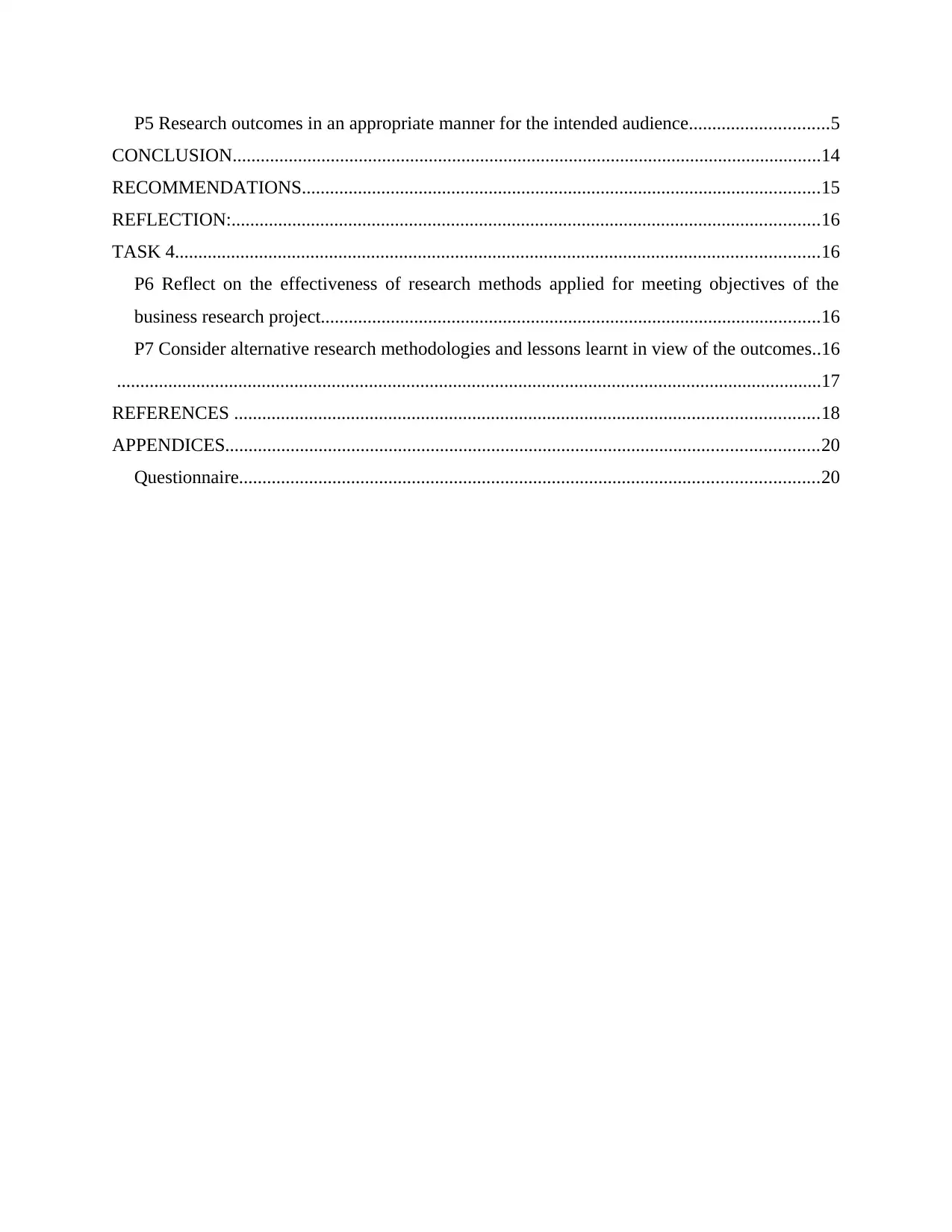
P5 Research outcomes in an appropriate manner for the intended audience..............................5
CONCLUSION..............................................................................................................................14
RECOMMENDATIONS...............................................................................................................15
REFLECTION:..............................................................................................................................16
TASK 4..........................................................................................................................................16
P6 Reflect on the effectiveness of research methods applied for meeting objectives of the
business research project...........................................................................................................16
P7 Consider alternative research methodologies and lessons learnt in view of the outcomes..16
.......................................................................................................................................................17
REFERENCES .............................................................................................................................18
APPENDICES...............................................................................................................................20
Questionnaire............................................................................................................................20
CONCLUSION..............................................................................................................................14
RECOMMENDATIONS...............................................................................................................15
REFLECTION:..............................................................................................................................16
TASK 4..........................................................................................................................................16
P6 Reflect on the effectiveness of research methods applied for meeting objectives of the
business research project...........................................................................................................16
P7 Consider alternative research methodologies and lessons learnt in view of the outcomes..16
.......................................................................................................................................................17
REFERENCES .............................................................................................................................18
APPENDICES...............................................................................................................................20
Questionnaire............................................................................................................................20
⊘ This is a preview!⊘
Do you want full access?
Subscribe today to unlock all pages.

Trusted by 1+ million students worldwide
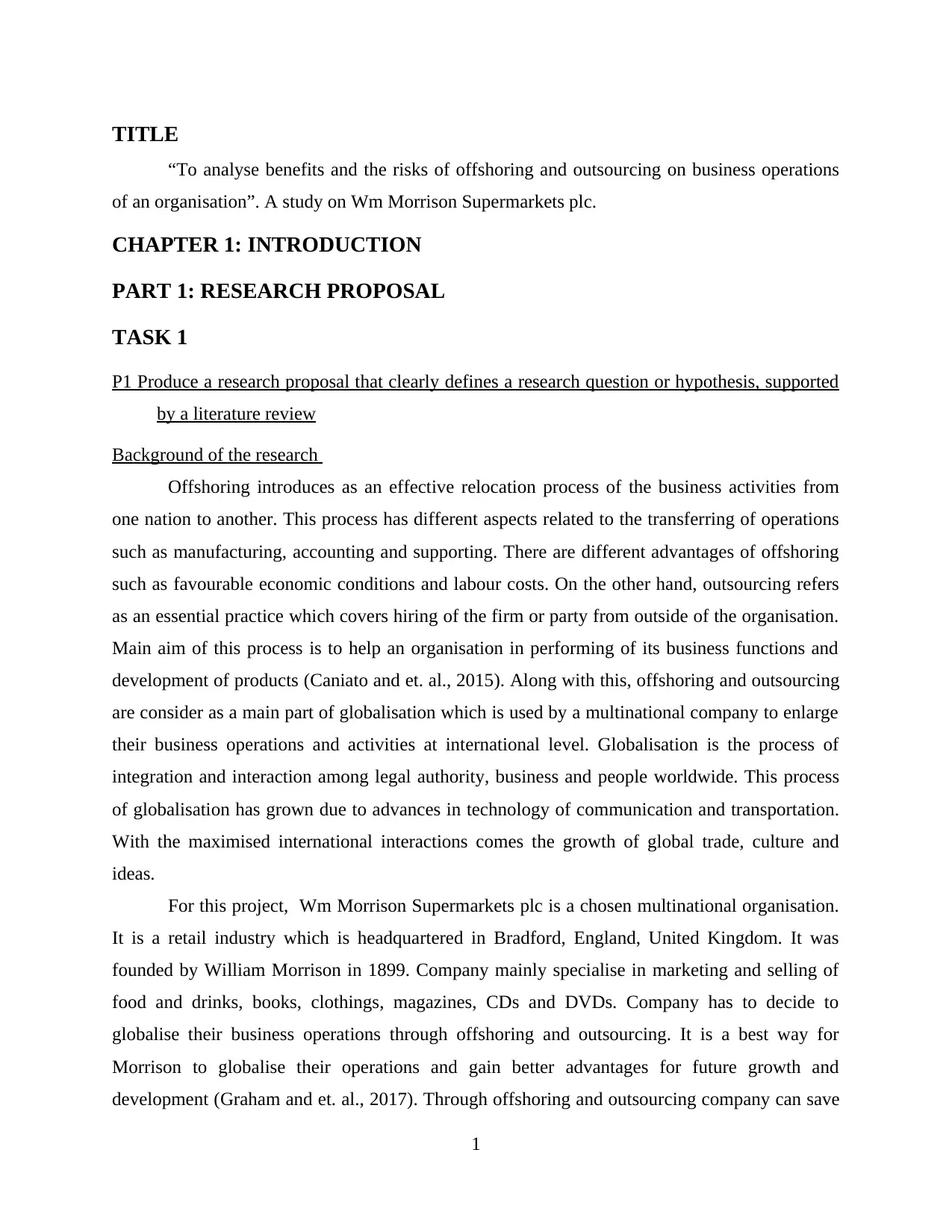
TITLE
“To analyse benefits and the risks of offshoring and outsourcing on business operations
of an organisation”. A study on Wm Morrison Supermarkets plc.
CHAPTER 1: INTRODUCTION
PART 1: RESEARCH PROPOSAL
TASK 1
P1 Produce a research proposal that clearly defines a research question or hypothesis, supported
by a literature review
Background of the research
Offshoring introduces as an effective relocation process of the business activities from
one nation to another. This process has different aspects related to the transferring of operations
such as manufacturing, accounting and supporting. There are different advantages of offshoring
such as favourable economic conditions and labour costs. On the other hand, outsourcing refers
as an essential practice which covers hiring of the firm or party from outside of the organisation.
Main aim of this process is to help an organisation in performing of its business functions and
development of products (Caniato and et. al., 2015). Along with this, offshoring and outsourcing
are consider as a main part of globalisation which is used by a multinational company to enlarge
their business operations and activities at international level. Globalisation is the process of
integration and interaction among legal authority, business and people worldwide. This process
of globalisation has grown due to advances in technology of communication and transportation.
With the maximised international interactions comes the growth of global trade, culture and
ideas.
For this project, Wm Morrison Supermarkets plc is a chosen multinational organisation.
It is a retail industry which is headquartered in Bradford, England, United Kingdom. It was
founded by William Morrison in 1899. Company mainly specialise in marketing and selling of
food and drinks, books, clothings, magazines, CDs and DVDs. Company has to decide to
globalise their business operations through offshoring and outsourcing. It is a best way for
Morrison to globalise their operations and gain better advantages for future growth and
development (Graham and et. al., 2017). Through offshoring and outsourcing company can save
1
“To analyse benefits and the risks of offshoring and outsourcing on business operations
of an organisation”. A study on Wm Morrison Supermarkets plc.
CHAPTER 1: INTRODUCTION
PART 1: RESEARCH PROPOSAL
TASK 1
P1 Produce a research proposal that clearly defines a research question or hypothesis, supported
by a literature review
Background of the research
Offshoring introduces as an effective relocation process of the business activities from
one nation to another. This process has different aspects related to the transferring of operations
such as manufacturing, accounting and supporting. There are different advantages of offshoring
such as favourable economic conditions and labour costs. On the other hand, outsourcing refers
as an essential practice which covers hiring of the firm or party from outside of the organisation.
Main aim of this process is to help an organisation in performing of its business functions and
development of products (Caniato and et. al., 2015). Along with this, offshoring and outsourcing
are consider as a main part of globalisation which is used by a multinational company to enlarge
their business operations and activities at international level. Globalisation is the process of
integration and interaction among legal authority, business and people worldwide. This process
of globalisation has grown due to advances in technology of communication and transportation.
With the maximised international interactions comes the growth of global trade, culture and
ideas.
For this project, Wm Morrison Supermarkets plc is a chosen multinational organisation.
It is a retail industry which is headquartered in Bradford, England, United Kingdom. It was
founded by William Morrison in 1899. Company mainly specialise in marketing and selling of
food and drinks, books, clothings, magazines, CDs and DVDs. Company has to decide to
globalise their business operations through offshoring and outsourcing. It is a best way for
Morrison to globalise their operations and gain better advantages for future growth and
development (Graham and et. al., 2017). Through offshoring and outsourcing company can save
1
Paraphrase This Document
Need a fresh take? Get an instant paraphrase of this document with our AI Paraphraser
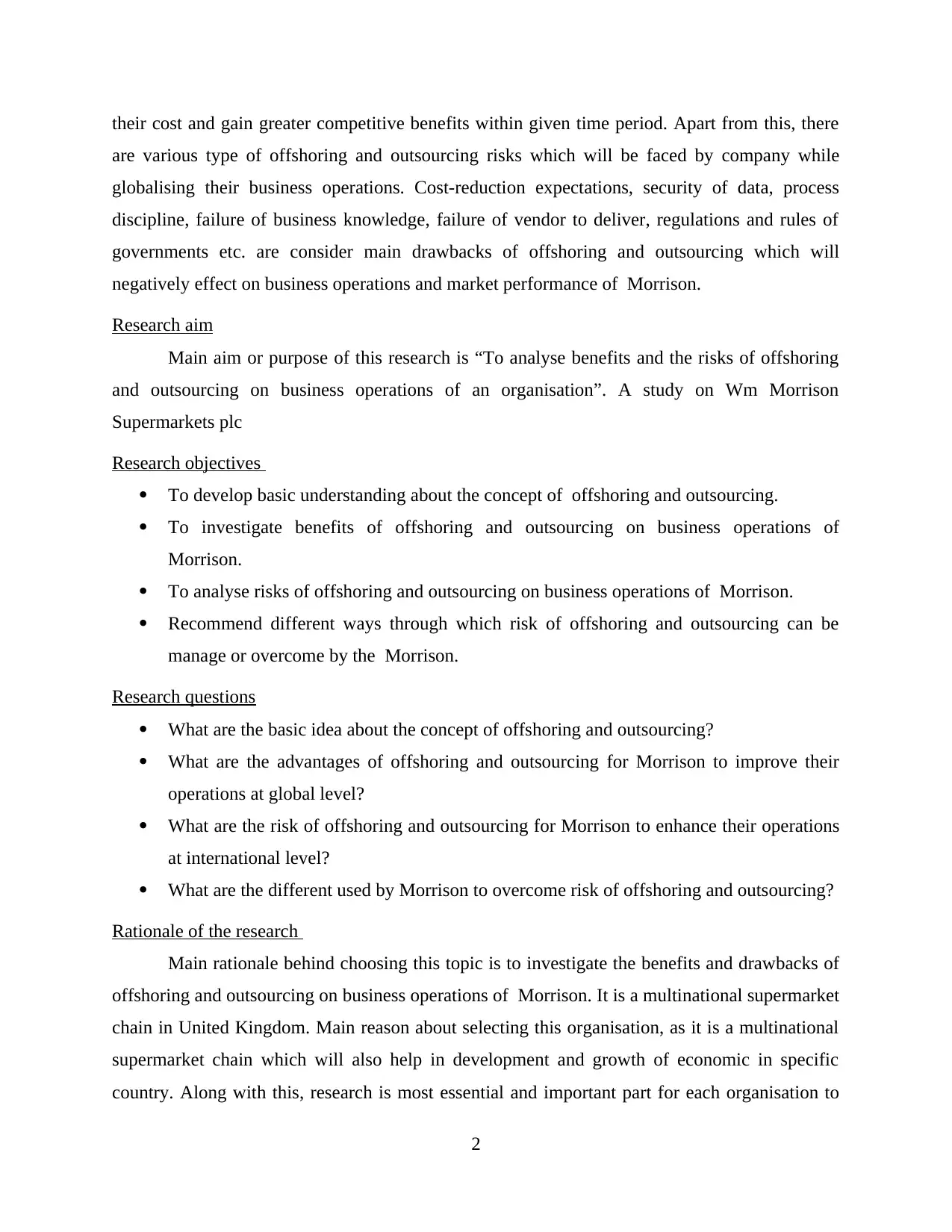
their cost and gain greater competitive benefits within given time period. Apart from this, there
are various type of offshoring and outsourcing risks which will be faced by company while
globalising their business operations. Cost-reduction expectations, security of data, process
discipline, failure of business knowledge, failure of vendor to deliver, regulations and rules of
governments etc. are consider main drawbacks of offshoring and outsourcing which will
negatively effect on business operations and market performance of Morrison.
Research aim
Main aim or purpose of this research is “To analyse benefits and the risks of offshoring
and outsourcing on business operations of an organisation”. A study on Wm Morrison
Supermarkets plc
Research objectives
To develop basic understanding about the concept of offshoring and outsourcing.
To investigate benefits of offshoring and outsourcing on business operations of
Morrison.
To analyse risks of offshoring and outsourcing on business operations of Morrison.
Recommend different ways through which risk of offshoring and outsourcing can be
manage or overcome by the Morrison.
Research questions
What are the basic idea about the concept of offshoring and outsourcing?
What are the advantages of offshoring and outsourcing for Morrison to improve their
operations at global level?
What are the risk of offshoring and outsourcing for Morrison to enhance their operations
at international level?
What are the different used by Morrison to overcome risk of offshoring and outsourcing?
Rationale of the research
Main rationale behind choosing this topic is to investigate the benefits and drawbacks of
offshoring and outsourcing on business operations of Morrison. It is a multinational supermarket
chain in United Kingdom. Main reason about selecting this organisation, as it is a multinational
supermarket chain which will also help in development and growth of economic in specific
country. Along with this, research is most essential and important part for each organisation to
2
are various type of offshoring and outsourcing risks which will be faced by company while
globalising their business operations. Cost-reduction expectations, security of data, process
discipline, failure of business knowledge, failure of vendor to deliver, regulations and rules of
governments etc. are consider main drawbacks of offshoring and outsourcing which will
negatively effect on business operations and market performance of Morrison.
Research aim
Main aim or purpose of this research is “To analyse benefits and the risks of offshoring
and outsourcing on business operations of an organisation”. A study on Wm Morrison
Supermarkets plc
Research objectives
To develop basic understanding about the concept of offshoring and outsourcing.
To investigate benefits of offshoring and outsourcing on business operations of
Morrison.
To analyse risks of offshoring and outsourcing on business operations of Morrison.
Recommend different ways through which risk of offshoring and outsourcing can be
manage or overcome by the Morrison.
Research questions
What are the basic idea about the concept of offshoring and outsourcing?
What are the advantages of offshoring and outsourcing for Morrison to improve their
operations at global level?
What are the risk of offshoring and outsourcing for Morrison to enhance their operations
at international level?
What are the different used by Morrison to overcome risk of offshoring and outsourcing?
Rationale of the research
Main rationale behind choosing this topic is to investigate the benefits and drawbacks of
offshoring and outsourcing on business operations of Morrison. It is a multinational supermarket
chain in United Kingdom. Main reason about selecting this organisation, as it is a multinational
supermarket chain which will also help in development and growth of economic in specific
country. Along with this, research is most essential and important part for each organisation to
2
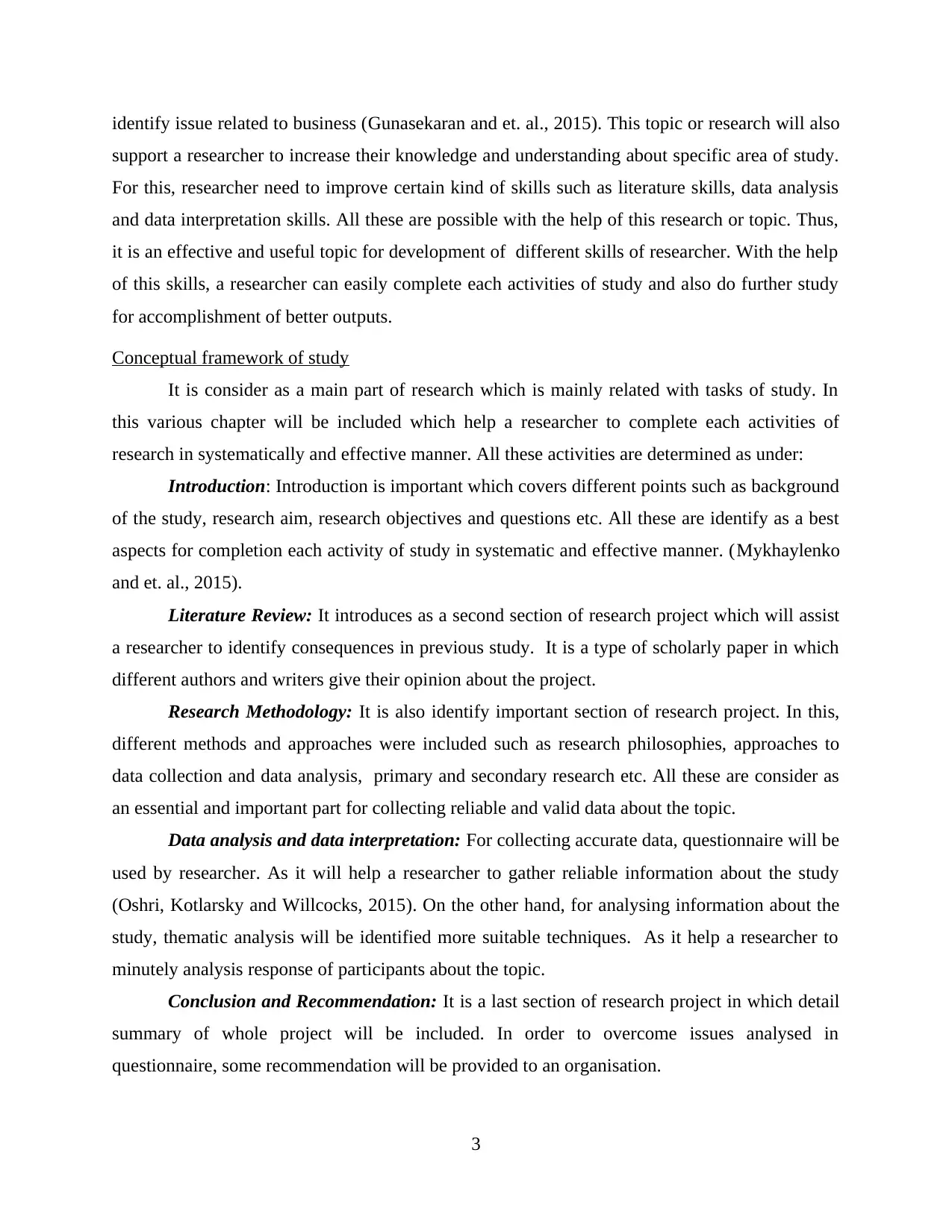
identify issue related to business (Gunasekaran and et. al., 2015). This topic or research will also
support a researcher to increase their knowledge and understanding about specific area of study.
For this, researcher need to improve certain kind of skills such as literature skills, data analysis
and data interpretation skills. All these are possible with the help of this research or topic. Thus,
it is an effective and useful topic for development of different skills of researcher. With the help
of this skills, a researcher can easily complete each activities of study and also do further study
for accomplishment of better outputs.
Conceptual framework of study
It is consider as a main part of research which is mainly related with tasks of study. In
this various chapter will be included which help a researcher to complete each activities of
research in systematically and effective manner. All these activities are determined as under:
Introduction: Introduction is important which covers different points such as background
of the study, research aim, research objectives and questions etc. All these are identify as a best
aspects for completion each activity of study in systematic and effective manner. (Mykhaylenko
and et. al., 2015).
Literature Review: It introduces as a second section of research project which will assist
a researcher to identify consequences in previous study. It is a type of scholarly paper in which
different authors and writers give their opinion about the project.
Research Methodology: It is also identify important section of research project. In this,
different methods and approaches were included such as research philosophies, approaches to
data collection and data analysis, primary and secondary research etc. All these are consider as
an essential and important part for collecting reliable and valid data about the topic.
Data analysis and data interpretation: For collecting accurate data, questionnaire will be
used by researcher. As it will help a researcher to gather reliable information about the study
(Oshri, Kotlarsky and Willcocks, 2015). On the other hand, for analysing information about the
study, thematic analysis will be identified more suitable techniques. As it help a researcher to
minutely analysis response of participants about the topic.
Conclusion and Recommendation: It is a last section of research project in which detail
summary of whole project will be included. In order to overcome issues analysed in
questionnaire, some recommendation will be provided to an organisation.
3
support a researcher to increase their knowledge and understanding about specific area of study.
For this, researcher need to improve certain kind of skills such as literature skills, data analysis
and data interpretation skills. All these are possible with the help of this research or topic. Thus,
it is an effective and useful topic for development of different skills of researcher. With the help
of this skills, a researcher can easily complete each activities of study and also do further study
for accomplishment of better outputs.
Conceptual framework of study
It is consider as a main part of research which is mainly related with tasks of study. In
this various chapter will be included which help a researcher to complete each activities of
research in systematically and effective manner. All these activities are determined as under:
Introduction: Introduction is important which covers different points such as background
of the study, research aim, research objectives and questions etc. All these are identify as a best
aspects for completion each activity of study in systematic and effective manner. (Mykhaylenko
and et. al., 2015).
Literature Review: It introduces as a second section of research project which will assist
a researcher to identify consequences in previous study. It is a type of scholarly paper in which
different authors and writers give their opinion about the project.
Research Methodology: It is also identify important section of research project. In this,
different methods and approaches were included such as research philosophies, approaches to
data collection and data analysis, primary and secondary research etc. All these are consider as
an essential and important part for collecting reliable and valid data about the topic.
Data analysis and data interpretation: For collecting accurate data, questionnaire will be
used by researcher. As it will help a researcher to gather reliable information about the study
(Oshri, Kotlarsky and Willcocks, 2015). On the other hand, for analysing information about the
study, thematic analysis will be identified more suitable techniques. As it help a researcher to
minutely analysis response of participants about the topic.
Conclusion and Recommendation: It is a last section of research project in which detail
summary of whole project will be included. In order to overcome issues analysed in
questionnaire, some recommendation will be provided to an organisation.
3
⊘ This is a preview!⊘
Do you want full access?
Subscribe today to unlock all pages.

Trusted by 1+ million students worldwide
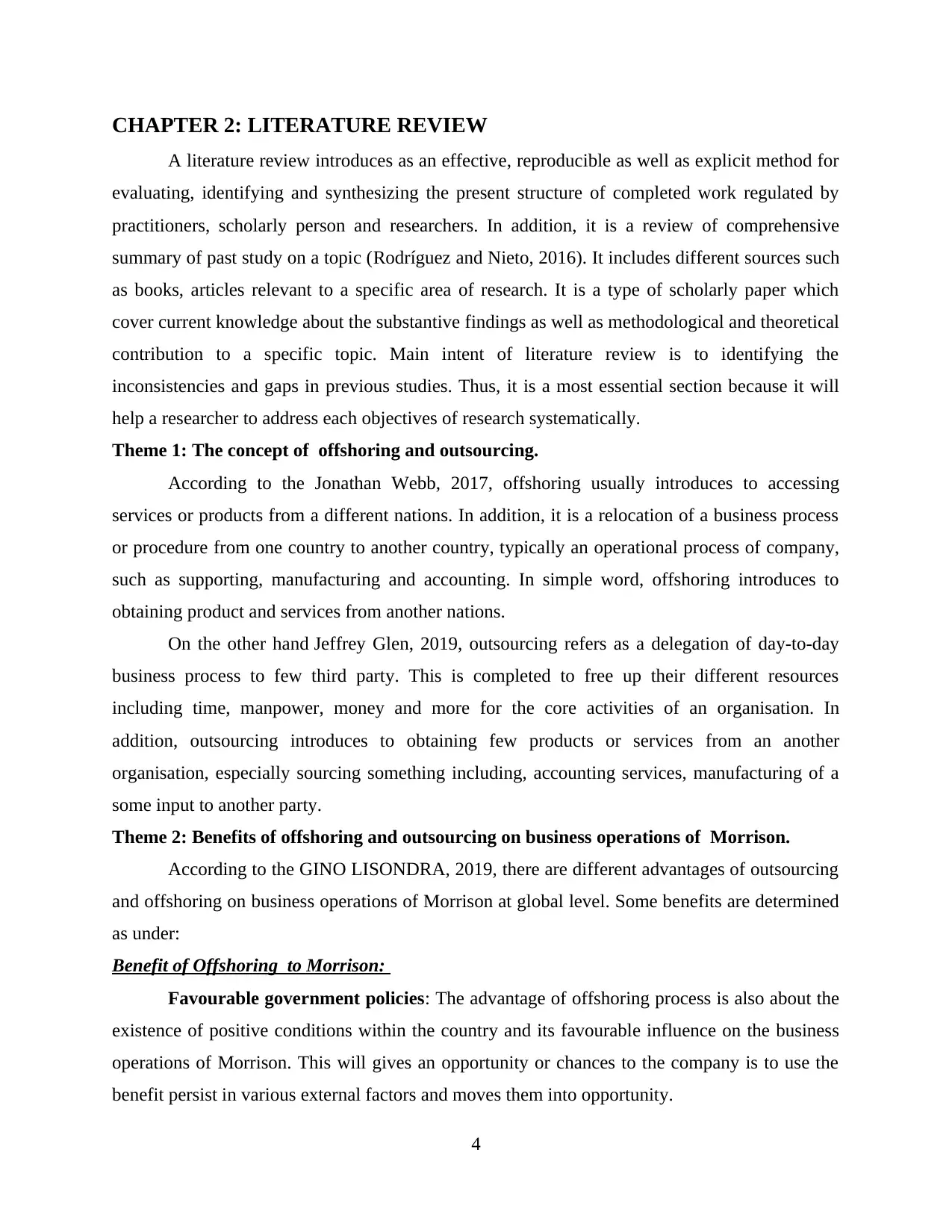
CHAPTER 2: LITERATURE REVIEW
A literature review introduces as an effective, reproducible as well as explicit method for
evaluating, identifying and synthesizing the present structure of completed work regulated by
practitioners, scholarly person and researchers. In addition, it is a review of comprehensive
summary of past study on a topic (Rodríguez and Nieto, 2016). It includes different sources such
as books, articles relevant to a specific area of research. It is a type of scholarly paper which
cover current knowledge about the substantive findings as well as methodological and theoretical
contribution to a specific topic. Main intent of literature review is to identifying the
inconsistencies and gaps in previous studies. Thus, it is a most essential section because it will
help a researcher to address each objectives of research systematically.
Theme 1: The concept of offshoring and outsourcing.
According to the Jonathan Webb, 2017, offshoring usually introduces to accessing
services or products from a different nations. In addition, it is a relocation of a business process
or procedure from one country to another country, typically an operational process of company,
such as supporting, manufacturing and accounting. In simple word, offshoring introduces to
obtaining product and services from another nations.
On the other hand Jeffrey Glen, 2019, outsourcing refers as a delegation of day-to-day
business process to few third party. This is completed to free up their different resources
including time, manpower, money and more for the core activities of an organisation. In
addition, outsourcing introduces to obtaining few products or services from an another
organisation, especially sourcing something including, accounting services, manufacturing of a
some input to another party.
Theme 2: Benefits of offshoring and outsourcing on business operations of Morrison.
According to the GINO LISONDRA, 2019, there are different advantages of outsourcing
and offshoring on business operations of Morrison at global level. Some benefits are determined
as under:
Benefit of Offshoring to Morrison:
Favourable government policies: The advantage of offshoring process is also about the
existence of positive conditions within the country and its favourable influence on the business
operations of Morrison. This will gives an opportunity or chances to the company is to use the
benefit persist in various external factors and moves them into opportunity.
4
A literature review introduces as an effective, reproducible as well as explicit method for
evaluating, identifying and synthesizing the present structure of completed work regulated by
practitioners, scholarly person and researchers. In addition, it is a review of comprehensive
summary of past study on a topic (Rodríguez and Nieto, 2016). It includes different sources such
as books, articles relevant to a specific area of research. It is a type of scholarly paper which
cover current knowledge about the substantive findings as well as methodological and theoretical
contribution to a specific topic. Main intent of literature review is to identifying the
inconsistencies and gaps in previous studies. Thus, it is a most essential section because it will
help a researcher to address each objectives of research systematically.
Theme 1: The concept of offshoring and outsourcing.
According to the Jonathan Webb, 2017, offshoring usually introduces to accessing
services or products from a different nations. In addition, it is a relocation of a business process
or procedure from one country to another country, typically an operational process of company,
such as supporting, manufacturing and accounting. In simple word, offshoring introduces to
obtaining product and services from another nations.
On the other hand Jeffrey Glen, 2019, outsourcing refers as a delegation of day-to-day
business process to few third party. This is completed to free up their different resources
including time, manpower, money and more for the core activities of an organisation. In
addition, outsourcing introduces to obtaining few products or services from an another
organisation, especially sourcing something including, accounting services, manufacturing of a
some input to another party.
Theme 2: Benefits of offshoring and outsourcing on business operations of Morrison.
According to the GINO LISONDRA, 2019, there are different advantages of outsourcing
and offshoring on business operations of Morrison at global level. Some benefits are determined
as under:
Benefit of Offshoring to Morrison:
Favourable government policies: The advantage of offshoring process is also about the
existence of positive conditions within the country and its favourable influence on the business
operations of Morrison. This will gives an opportunity or chances to the company is to use the
benefit persist in various external factors and moves them into opportunity.
4
Paraphrase This Document
Need a fresh take? Get an instant paraphrase of this document with our AI Paraphraser
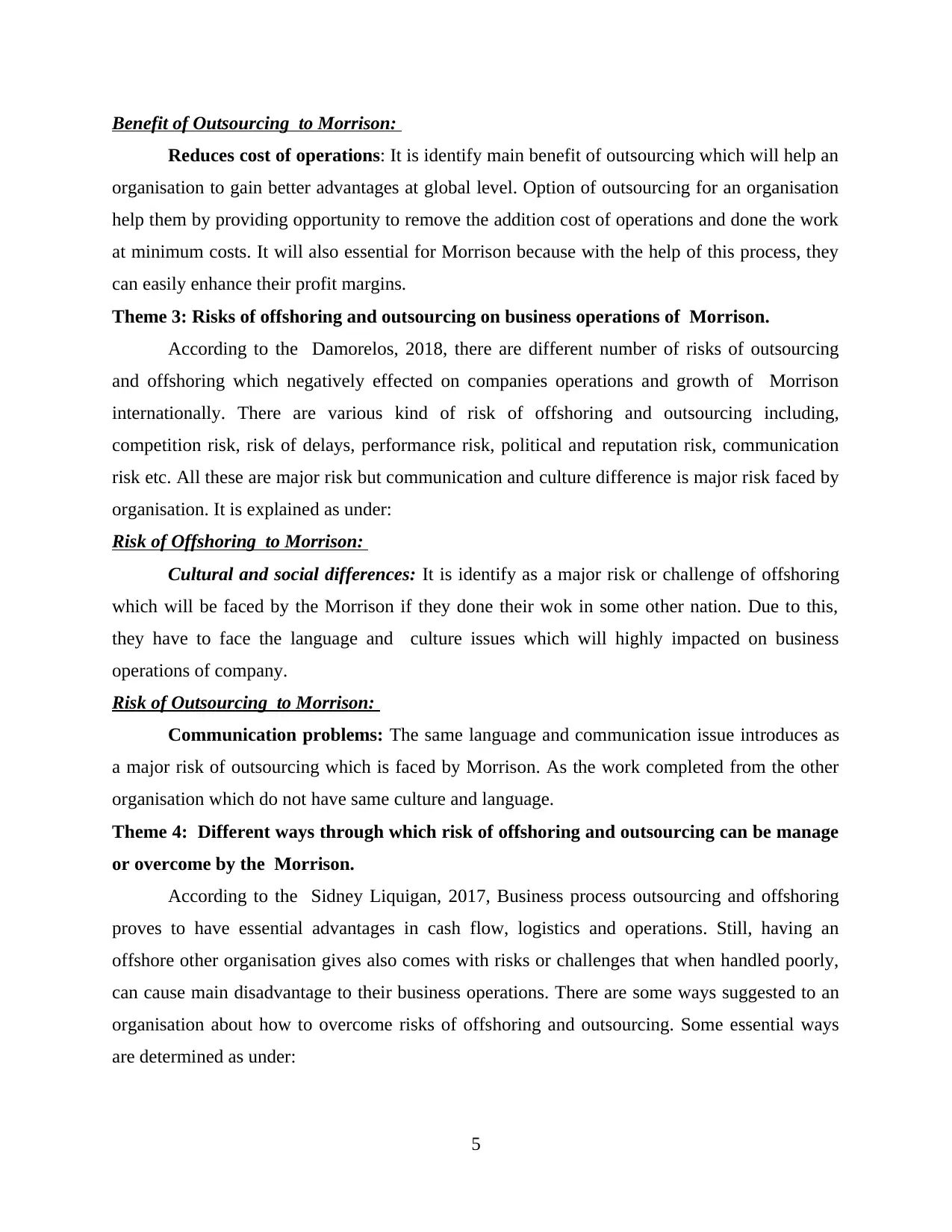
Benefit of Outsourcing to Morrison:
Reduces cost of operations: It is identify main benefit of outsourcing which will help an
organisation to gain better advantages at global level. Option of outsourcing for an organisation
help them by providing opportunity to remove the addition cost of operations and done the work
at minimum costs. It will also essential for Morrison because with the help of this process, they
can easily enhance their profit margins.
Theme 3: Risks of offshoring and outsourcing on business operations of Morrison.
According to the Damorelos, 2018, there are different number of risks of outsourcing
and offshoring which negatively effected on companies operations and growth of Morrison
internationally. There are various kind of risk of offshoring and outsourcing including,
competition risk, risk of delays, performance risk, political and reputation risk, communication
risk etc. All these are major risk but communication and culture difference is major risk faced by
organisation. It is explained as under:
Risk of Offshoring to Morrison:
Cultural and social differences: It is identify as a major risk or challenge of offshoring
which will be faced by the Morrison if they done their wok in some other nation. Due to this,
they have to face the language and culture issues which will highly impacted on business
operations of company.
Risk of Outsourcing to Morrison:
Communication problems: The same language and communication issue introduces as
a major risk of outsourcing which is faced by Morrison. As the work completed from the other
organisation which do not have same culture and language.
Theme 4: Different ways through which risk of offshoring and outsourcing can be manage
or overcome by the Morrison.
According to the Sidney Liquigan, 2017, Business process outsourcing and offshoring
proves to have essential advantages in cash flow, logistics and operations. Still, having an
offshore other organisation gives also comes with risks or challenges that when handled poorly,
can cause main disadvantage to their business operations. There are some ways suggested to an
organisation about how to overcome risks of offshoring and outsourcing. Some essential ways
are determined as under:
5
Reduces cost of operations: It is identify main benefit of outsourcing which will help an
organisation to gain better advantages at global level. Option of outsourcing for an organisation
help them by providing opportunity to remove the addition cost of operations and done the work
at minimum costs. It will also essential for Morrison because with the help of this process, they
can easily enhance their profit margins.
Theme 3: Risks of offshoring and outsourcing on business operations of Morrison.
According to the Damorelos, 2018, there are different number of risks of outsourcing
and offshoring which negatively effected on companies operations and growth of Morrison
internationally. There are various kind of risk of offshoring and outsourcing including,
competition risk, risk of delays, performance risk, political and reputation risk, communication
risk etc. All these are major risk but communication and culture difference is major risk faced by
organisation. It is explained as under:
Risk of Offshoring to Morrison:
Cultural and social differences: It is identify as a major risk or challenge of offshoring
which will be faced by the Morrison if they done their wok in some other nation. Due to this,
they have to face the language and culture issues which will highly impacted on business
operations of company.
Risk of Outsourcing to Morrison:
Communication problems: The same language and communication issue introduces as
a major risk of outsourcing which is faced by Morrison. As the work completed from the other
organisation which do not have same culture and language.
Theme 4: Different ways through which risk of offshoring and outsourcing can be manage
or overcome by the Morrison.
According to the Sidney Liquigan, 2017, Business process outsourcing and offshoring
proves to have essential advantages in cash flow, logistics and operations. Still, having an
offshore other organisation gives also comes with risks or challenges that when handled poorly,
can cause main disadvantage to their business operations. There are some ways suggested to an
organisation about how to overcome risks of offshoring and outsourcing. Some essential ways
are determined as under:
5
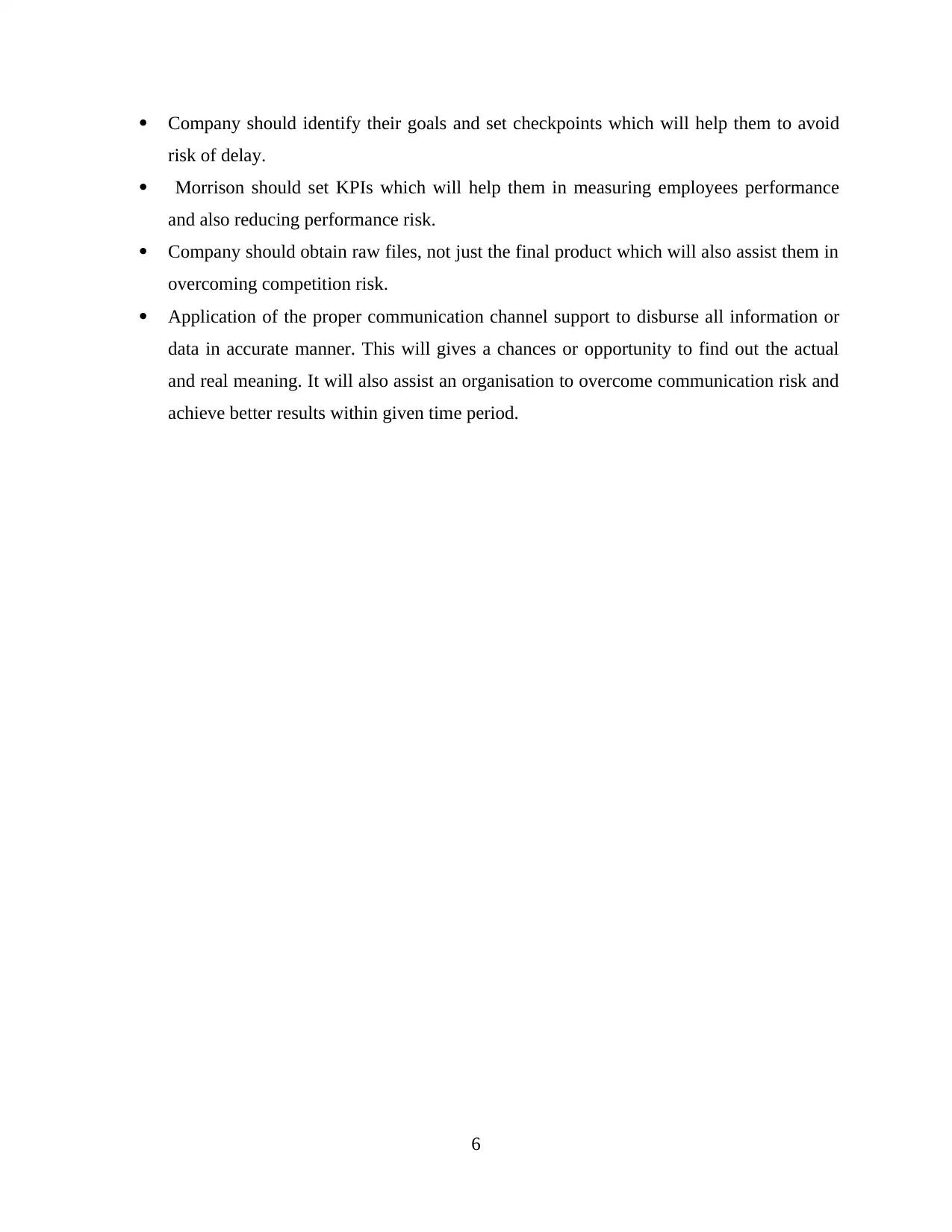
Company should identify their goals and set checkpoints which will help them to avoid
risk of delay.
Morrison should set KPIs which will help them in measuring employees performance
and also reducing performance risk.
Company should obtain raw files, not just the final product which will also assist them in
overcoming competition risk.
Application of the proper communication channel support to disburse all information or
data in accurate manner. This will gives a chances or opportunity to find out the actual
and real meaning. It will also assist an organisation to overcome communication risk and
achieve better results within given time period.
6
risk of delay.
Morrison should set KPIs which will help them in measuring employees performance
and also reducing performance risk.
Company should obtain raw files, not just the final product which will also assist them in
overcoming competition risk.
Application of the proper communication channel support to disburse all information or
data in accurate manner. This will gives a chances or opportunity to find out the actual
and real meaning. It will also assist an organisation to overcome communication risk and
achieve better results within given time period.
6
⊘ This is a preview!⊘
Do you want full access?
Subscribe today to unlock all pages.

Trusted by 1+ million students worldwide
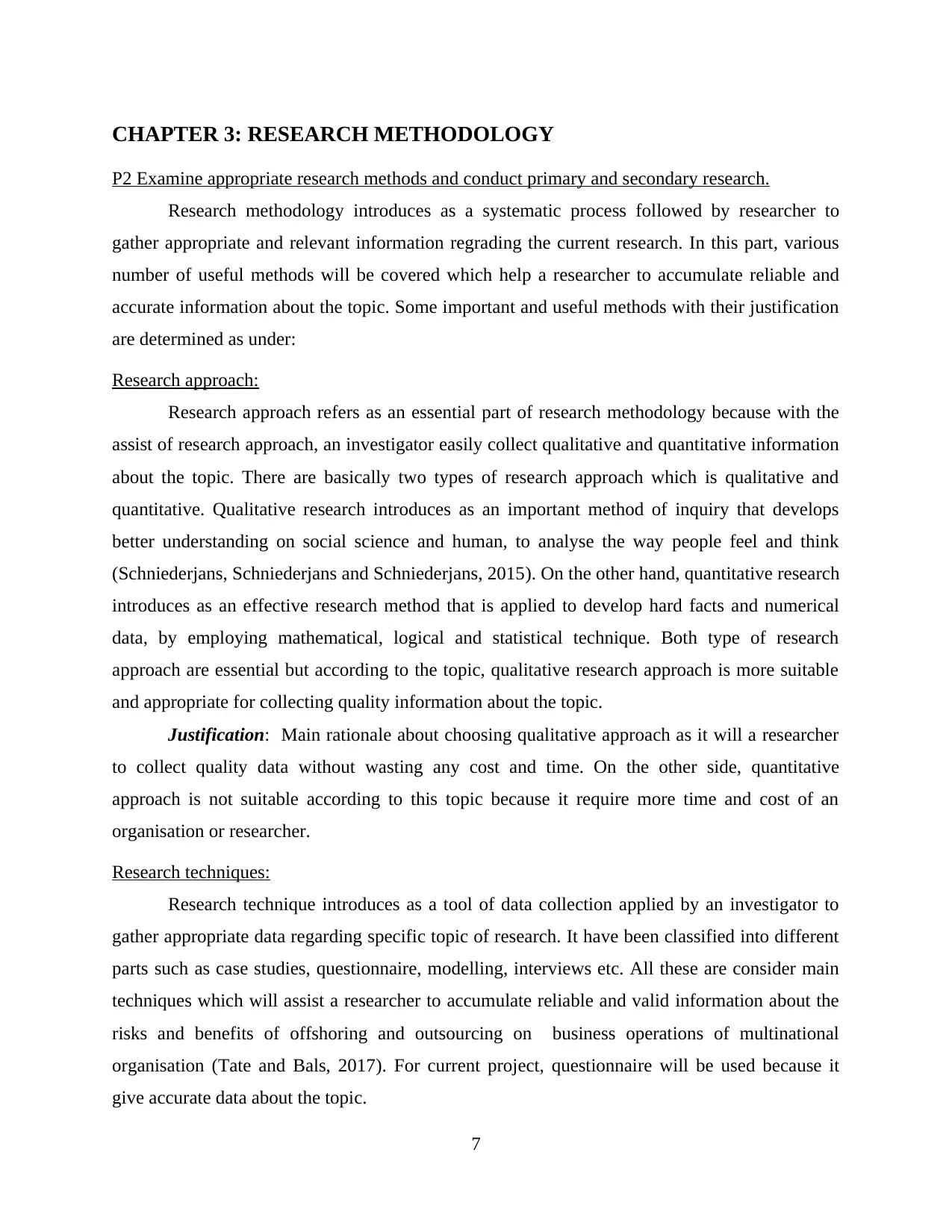
CHAPTER 3: RESEARCH METHODOLOGY
P2 Examine appropriate research methods and conduct primary and secondary research.
Research methodology introduces as a systematic process followed by researcher to
gather appropriate and relevant information regrading the current research. In this part, various
number of useful methods will be covered which help a researcher to accumulate reliable and
accurate information about the topic. Some important and useful methods with their justification
are determined as under:
Research approach:
Research approach refers as an essential part of research methodology because with the
assist of research approach, an investigator easily collect qualitative and quantitative information
about the topic. There are basically two types of research approach which is qualitative and
quantitative. Qualitative research introduces as an important method of inquiry that develops
better understanding on social science and human, to analyse the way people feel and think
(Schniederjans, Schniederjans and Schniederjans, 2015). On the other hand, quantitative research
introduces as an effective research method that is applied to develop hard facts and numerical
data, by employing mathematical, logical and statistical technique. Both type of research
approach are essential but according to the topic, qualitative research approach is more suitable
and appropriate for collecting quality information about the topic.
Justification: Main rationale about choosing qualitative approach as it will a researcher
to collect quality data without wasting any cost and time. On the other side, quantitative
approach is not suitable according to this topic because it require more time and cost of an
organisation or researcher.
Research techniques:
Research technique introduces as a tool of data collection applied by an investigator to
gather appropriate data regarding specific topic of research. It have been classified into different
parts such as case studies, questionnaire, modelling, interviews etc. All these are consider main
techniques which will assist a researcher to accumulate reliable and valid information about the
risks and benefits of offshoring and outsourcing on business operations of multinational
organisation (Tate and Bals, 2017). For current project, questionnaire will be used because it
give accurate data about the topic.
7
P2 Examine appropriate research methods and conduct primary and secondary research.
Research methodology introduces as a systematic process followed by researcher to
gather appropriate and relevant information regrading the current research. In this part, various
number of useful methods will be covered which help a researcher to accumulate reliable and
accurate information about the topic. Some important and useful methods with their justification
are determined as under:
Research approach:
Research approach refers as an essential part of research methodology because with the
assist of research approach, an investigator easily collect qualitative and quantitative information
about the topic. There are basically two types of research approach which is qualitative and
quantitative. Qualitative research introduces as an important method of inquiry that develops
better understanding on social science and human, to analyse the way people feel and think
(Schniederjans, Schniederjans and Schniederjans, 2015). On the other hand, quantitative research
introduces as an effective research method that is applied to develop hard facts and numerical
data, by employing mathematical, logical and statistical technique. Both type of research
approach are essential but according to the topic, qualitative research approach is more suitable
and appropriate for collecting quality information about the topic.
Justification: Main rationale about choosing qualitative approach as it will a researcher
to collect quality data without wasting any cost and time. On the other side, quantitative
approach is not suitable according to this topic because it require more time and cost of an
organisation or researcher.
Research techniques:
Research technique introduces as a tool of data collection applied by an investigator to
gather appropriate data regarding specific topic of research. It have been classified into different
parts such as case studies, questionnaire, modelling, interviews etc. All these are consider main
techniques which will assist a researcher to accumulate reliable and valid information about the
risks and benefits of offshoring and outsourcing on business operations of multinational
organisation (Tate and Bals, 2017). For current project, questionnaire will be used because it
give accurate data about the topic.
7
Paraphrase This Document
Need a fresh take? Get an instant paraphrase of this document with our AI Paraphraser
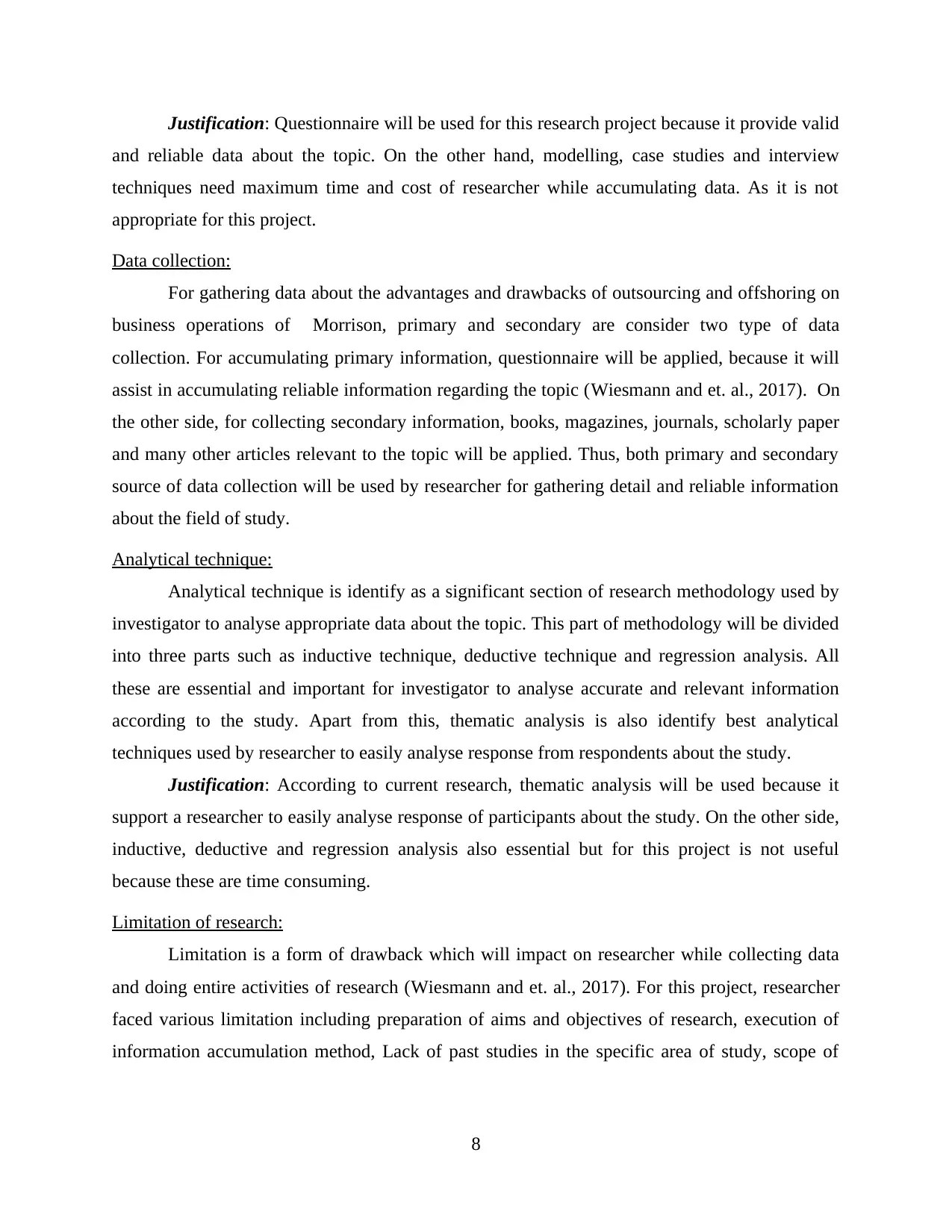
Justification: Questionnaire will be used for this research project because it provide valid
and reliable data about the topic. On the other hand, modelling, case studies and interview
techniques need maximum time and cost of researcher while accumulating data. As it is not
appropriate for this project.
Data collection:
For gathering data about the advantages and drawbacks of outsourcing and offshoring on
business operations of Morrison, primary and secondary are consider two type of data
collection. For accumulating primary information, questionnaire will be applied, because it will
assist in accumulating reliable information regarding the topic (Wiesmann and et. al., 2017). On
the other side, for collecting secondary information, books, magazines, journals, scholarly paper
and many other articles relevant to the topic will be applied. Thus, both primary and secondary
source of data collection will be used by researcher for gathering detail and reliable information
about the field of study.
Analytical technique:
Analytical technique is identify as a significant section of research methodology used by
investigator to analyse appropriate data about the topic. This part of methodology will be divided
into three parts such as inductive technique, deductive technique and regression analysis. All
these are essential and important for investigator to analyse accurate and relevant information
according to the study. Apart from this, thematic analysis is also identify best analytical
techniques used by researcher to easily analyse response from respondents about the study.
Justification: According to current research, thematic analysis will be used because it
support a researcher to easily analyse response of participants about the study. On the other side,
inductive, deductive and regression analysis also essential but for this project is not useful
because these are time consuming.
Limitation of research:
Limitation is a form of drawback which will impact on researcher while collecting data
and doing entire activities of research (Wiesmann and et. al., 2017). For this project, researcher
faced various limitation including preparation of aims and objectives of research, execution of
information accumulation method, Lack of past studies in the specific area of study, scope of
8
and reliable data about the topic. On the other hand, modelling, case studies and interview
techniques need maximum time and cost of researcher while accumulating data. As it is not
appropriate for this project.
Data collection:
For gathering data about the advantages and drawbacks of outsourcing and offshoring on
business operations of Morrison, primary and secondary are consider two type of data
collection. For accumulating primary information, questionnaire will be applied, because it will
assist in accumulating reliable information regarding the topic (Wiesmann and et. al., 2017). On
the other side, for collecting secondary information, books, magazines, journals, scholarly paper
and many other articles relevant to the topic will be applied. Thus, both primary and secondary
source of data collection will be used by researcher for gathering detail and reliable information
about the field of study.
Analytical technique:
Analytical technique is identify as a significant section of research methodology used by
investigator to analyse appropriate data about the topic. This part of methodology will be divided
into three parts such as inductive technique, deductive technique and regression analysis. All
these are essential and important for investigator to analyse accurate and relevant information
according to the study. Apart from this, thematic analysis is also identify best analytical
techniques used by researcher to easily analyse response from respondents about the study.
Justification: According to current research, thematic analysis will be used because it
support a researcher to easily analyse response of participants about the study. On the other side,
inductive, deductive and regression analysis also essential but for this project is not useful
because these are time consuming.
Limitation of research:
Limitation is a form of drawback which will impact on researcher while collecting data
and doing entire activities of research (Wiesmann and et. al., 2017). For this project, researcher
faced various limitation including preparation of aims and objectives of research, execution of
information accumulation method, Lack of past studies in the specific area of study, scope of
8
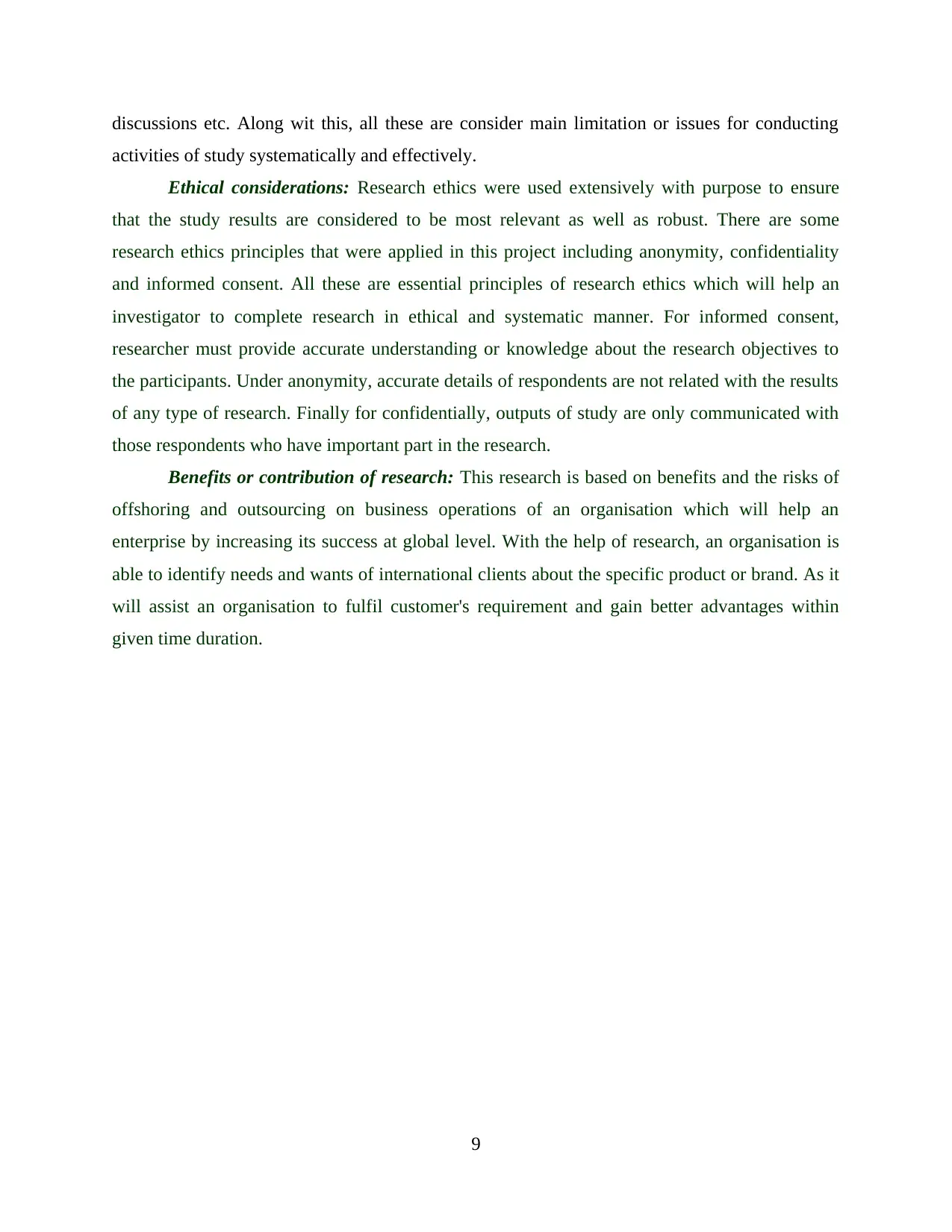
discussions etc. Along wit this, all these are consider main limitation or issues for conducting
activities of study systematically and effectively.
Ethical considerations: Research ethics were used extensively with purpose to ensure
that the study results are considered to be most relevant as well as robust. There are some
research ethics principles that were applied in this project including anonymity, confidentiality
and informed consent. All these are essential principles of research ethics which will help an
investigator to complete research in ethical and systematic manner. For informed consent,
researcher must provide accurate understanding or knowledge about the research objectives to
the participants. Under anonymity, accurate details of respondents are not related with the results
of any type of research. Finally for confidentially, outputs of study are only communicated with
those respondents who have important part in the research.
Benefits or contribution of research: This research is based on benefits and the risks of
offshoring and outsourcing on business operations of an organisation which will help an
enterprise by increasing its success at global level. With the help of research, an organisation is
able to identify needs and wants of international clients about the specific product or brand. As it
will assist an organisation to fulfil customer's requirement and gain better advantages within
given time duration.
9
activities of study systematically and effectively.
Ethical considerations: Research ethics were used extensively with purpose to ensure
that the study results are considered to be most relevant as well as robust. There are some
research ethics principles that were applied in this project including anonymity, confidentiality
and informed consent. All these are essential principles of research ethics which will help an
investigator to complete research in ethical and systematic manner. For informed consent,
researcher must provide accurate understanding or knowledge about the research objectives to
the participants. Under anonymity, accurate details of respondents are not related with the results
of any type of research. Finally for confidentially, outputs of study are only communicated with
those respondents who have important part in the research.
Benefits or contribution of research: This research is based on benefits and the risks of
offshoring and outsourcing on business operations of an organisation which will help an
enterprise by increasing its success at global level. With the help of research, an organisation is
able to identify needs and wants of international clients about the specific product or brand. As it
will assist an organisation to fulfil customer's requirement and gain better advantages within
given time duration.
9
⊘ This is a preview!⊘
Do you want full access?
Subscribe today to unlock all pages.

Trusted by 1+ million students worldwide
1 out of 37
Related Documents
Your All-in-One AI-Powered Toolkit for Academic Success.
+13062052269
info@desklib.com
Available 24*7 on WhatsApp / Email
![[object Object]](/_next/static/media/star-bottom.7253800d.svg)
Unlock your academic potential
Copyright © 2020–2026 A2Z Services. All Rights Reserved. Developed and managed by ZUCOL.





